Sustainable design and business models - NTNU Sustainability
- NTNU Sustainability - Home
- Narrating Sustainability
- About NTNU Sustainability
- Institutional framework
- Sustainable urban and regional development
- Biodiversity and ecosystem services
- Environmental and sustainability assessments
- ICT as an enabling technology
- Ethical perspectives
- Sustainable design and business models
- Land use
- Pilot projects
- News & Documents
- Activities
- Circular Economy and Resource Efficiency
- Circular City
- Combining skills to identify the «Sweet Spot» to solve marine plastic pollution in Norway
- Sustainable hydropower development and reservoir management as an enabler of the renewable energy transition and an accelerator to meet the UN Sustainable Development Goals (SusHydro)
- Nature-based solutions for land use transitions towards more sustainable societies
- MAPLE – Marine Plastic Pollution: Environmental Impact and life cycle scenarios
- Sustainability research (SusRes)
- Triple Deep – The Deep Dilemmas: Deep Sea Mining for the new Deep Transition
- HolE-LIB – Developing a Holistic Ecosystem for Sustainable Repurposing and/or Recycling of Lithium-ion Batteries (LIBs) in Norway and the EU
- Sustainable digital transformations (SustainDiT)
- Interdisciplinary cooperation for Sustainability
- Sustainable Built Environments for better Health and WELL-being (SWELL)
NTNU Sustainability banner

Sustainable design and business models
Sustainable design and business models
Effective use of energy, land and material resources is important to all the key areas and a critical factor for realizing sustainable development of society. It is vital to emphasize resource efficiency throughout the product life cycle, from the extraction of resources and raw materials, through manufacturing and distribution processes, to end use in the individual sector.
Results from sustainability analysis should be integrated early in the design process to ensure sustainable products, and this knowledge should be integrated in strategic decision-making processes in the businesses. Research on barriers and opportunities throughout the value chain will be a pervasive theme in all the key areas.
Research questions
-
Goals and institutional framework, hereunder green taxation and business incentives for innovation, sustainable design and green value creation.
-
Sustainable urban development, hereunder promotion of sustainable products, materials with low energy- and eco-footprints, and choices of eco-designs in urban planning and design of infrastructure.
-
Biodiversity and ecosystem services, hereunder design- and business models to enhance reduced degradation of natural resources and environmental impacts in their extended supply chains.
-
Environmental and sustainability analyses, hereunder utilize analytical tools and results from sustainability life cycle impact assessment to communicate environmental and sustainability performance of products and organisations, and to build strategic multi-criteria decission support.
Ongoing projects
Ongoing projects
The network project will start in September 2016 and will offer businesses and research institutes in Norway a common platform to exchange knowledge related to innovative and green solutions that provide competitiveness and contribute to expand national expertise on business models for sustainability. The network will focus on interdisciplinary collaboration and targeted use of business model which address sustainability over time. Tools and methods to stimulate and measure the performance of environmental, social, governance (ESG) factors as well as financial perspectives will be developed. The network is funded through the Norwegian Research Program BIA.
Contacts: Sunniva Bratt Slette / Annik Magerholm Fet
The Norwegian University of Science and Technology (NTNU), Delft University of Technology (TU Delft) and the University of Lisbon (IST) will work with universities in Uganda, India and Nepal to develop, support and enhance the study of sustainable development, cleaner production and environmental management principles, ultimately resulting in green value creation. CAPSEM is therefore a joint capacity-building, multi-country project. The project will address the regional priority of environmental protection and the overarching goal of sustainable development by asserting the strategy of cleaner production (CP) and environmental management. The project will provide knowledge and understanding of the relationship between sustainability theory, research traditions and methodologies, and their interactions in a practical context.
Contacts: Haley Knudson / Annik Magerholm Fet
The objective is to significantly advance the understanding of how non-development policies and regulations aimed at private and public market actors contribute to or undermine development policies. The project is lead by professor Beate Sjåfjell at University in Oslo (UiO). The SMART Consortium consists of a dedicated and well-integrated team of scholars from various disciplines and jurisdictions, representing 25 institutions from around the world. NTNU is a third party with UiO. This project is funded by the Horizon 2020 Framework Programme. More information about the project here.
Contacts: John Hermansen / Annik Magerholm Fet.
NTNU Wood is a multidiscplinary research and education effort to better utilize the Norwegian forest as a natural and renewable resource. Through the development of new products, processes and concepts, NTNU Wood enables companies to utilize this abundant raw material. Biomaterials is an essential contribution towards a low emission society, and NTNU Wood will provide cutting edge knowledge specifically focused on the Norwegian climate, markets and society. With the aid of researchers, students and the 42 member companies and governmental institutions, NTNU Wood will strive to discover new opportunities in the fields of architecture, engineering, design, material science, economy, manufacturing, digitalization and wood technology.
Contact: Pasi Aalto / Annik Magerholm Fet
The EU-funded Circular Ocean project will develop, share and test new solutions and opportunities for processing, recycling and repurposing of marine plastic waste. The project is a collaboration between the research partners North Highland College, Macroom E Enterprise Centre, University for the Creative Arts, the Technical University of Denmark and NTNU. NTNUs contribution to the project is development and application of decision support tools for sustainability assessments. More information about the project here.
Contacts: Dina Margrete Aspen / Annik Magerholm Fet.
The project aims to create new knowledge for energy efficient and sustainable processing and applications of macroalgae as human food and animal feed. The NFR-funded project is managed by Møreforskning and NTNU contributes with life-cycle decision support methods and models for sustainable production. More information about the project here.
Contacts: Jon Halfdanarson / Annik Magerholm Fet.
Biochar is the charcoal product obtained when agricultural waste is heated with limited access to oxygen (pyrolysis). In contrast to organic material, biochar is stable for thousands of years when mixed into soils, and thus represents carbon that is actively removed from the short-lived carbon cycle. The project has a multidisciplinary approach to gain a systemic perspective on biochar use. The project is lead by the Norwegian Geotechnical Institute (NGI) and NTNU is a partner together with NMBU, Vista Analyse, Royal Norwegian Society for Development, Danish Technical University (DTU), Cornell University USA, UNDP, Jakarta, Indonesia, and Indonesian Soil Research Institute (ISRI). The project is funded by the Norwegian Research Council’s program KLIMAFORSK. More information about the project here.
Contact: Magnus Sparrevik / Annik Magerholm Fet.
The project aims to develop knowledge that strengthens the Norwegian industry’s long-term competitive capabilities in a way consistent with the concept of sustainability and shared value. This means that value is created in a manner that meets both financial and societal needs where the latter typically encompasses environmental and social aspects. The project is lead by NTNU, Department of Industrial Economics and Technology management, and project partners are Sintef RaufossManufacturing AS , Plasto AS, Hexagon Ragasco AS, Isiflow AS, Wonderland AS, Molde kunnskapspark (MKP) and Ålesund kunnskapspark (ÅKP). SISVI is a knowledge-buidling project funded through the Norwegian Research Council’s program BIA.
Contacts: Sigurd Vildåsen / Annik Magerholm Fet
This project aims to increase sustainability in customer-driven and capital-intensive offshore shipbuilding by achieving innovations that ensure high environmental and economical performance in uncertain, fluctuating markets. NTNU is project manager and the research activities are carried out in collaboration with SINTEF and the industrial partners Ulstein International AS, Fiskerstrand Holding AS and PON POWER AS. The project is funded by the Research Council of Norway's MAROFF program, with financial support from the industrial partners. More information about the project here.
Contacts: Dina Margrete Aspen / Annik Magerholm Fet.
NTNU is part of the regional network to connect knowledge, experience and capacities of the Northern Europe’s academic, business and civil society actors. The network promotes national and regional sustainable development of Northern Europe, and works to integrate regional solutions for sustainable development worldwide. SDSN NE targets to generate new solutions through its network activities, and aligns closely with current political processes in intersection with business communities. The first project report on Sustainable Development Goals Index & Dashboards can be found here, with general information about the project here.
Presentations & Reports
Presentations & Reports
NTNU Wood - Sustainable wood industry

The AB Faculty at NTNU with industry partners at the research centre NTNU Wood launch the new ARENA centre.
Circular Ocean won prestigious EU award

Circular Ocean won the European Commission’s Public Choice RegionStars Award!
NTNU and UiB held Network Conference in Brussels

Seminar to strengthen partnerships to increase Norway´s presence in European research communities and to implement sustainable business models for the UN´s SDGs .
Norge trenger en grønn investeringsbank - Masteroppgave i Energi og Klima
Masterstudentene Synne Mari Pedersen og Sunniva Bratt Slette forsket på hvordan en grønn investeringsbank kan få en nøkkelrolle i utviklingen av norsk konkurransekraft internasjonalt.
Grønn innovasjon i et livsløpsperspektiv - Lerchendalkonferansen 2015
NTNU presents paper at Environmental Goods Outreach Session
"An Evaluation of Environmental Goods (EGs) for the WTO EGA: EGs for Developing Countries" (pdf). By Haley Knudson, Dina Margrethe Aspen and John Eilif Hermansen.
 Report:
Report:
Eco-Lighthouse Foundation, Survey 2013 (abstract in English)

